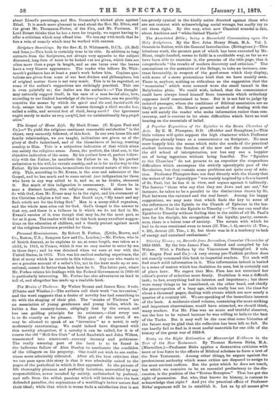A Popular Exposition of the Epistles to the Seven Churches
of Asia. By E. H. Plumptre, D.D. (Hodder and Stoughton.)—This little volume will quite support the high character which Professor Plumptre already bears as a commentator on Scripture. No man more happily hits the mean which snits the needs of the practical student between the freedom of the new and the constraints of the old school of interpretation, nor has any one a happier art of being ingenious without being fanciful. The "Epistles to the Churches" do not present to an expositor the stupendous difficulties which encompass the strictly apocalyptic part of the Revelation, but they contain some problems not quite easy of solu- tion. Professor Plumptre does not deal directly with the theory that the writer of the "Apocalypse " was mainly inspired by a fierce hatred of St. Paul, but he has it in view, and argues against it indirectly. The famous " those who say that they are Jews and are not," for instance, he takes to be a parallel to the distinctions drawn by St. Paul between the outward and the real Israel. Among his happy suggestions, we may note that which finds the key to some of the references in the Epistle to the Church of Ephesus in the lan- guage of St. Paul in the Epistle to Timothy :—" No one can read the Epistles to Timothy without feeling that in the midst of all St. Paul's love for his disciple, his recognition of his loyalty, purity, earnest- ness, there is a latent tone of anxiety. The nature with which he had to do was emotional even to tears (II. Tim., i. 4), ascetic (I. Tim., v. 23), devout (II. Tim., i. 5), but there was in it a tendency to lack of energy and sustained enthusiasm."






































 Previous page
Previous page